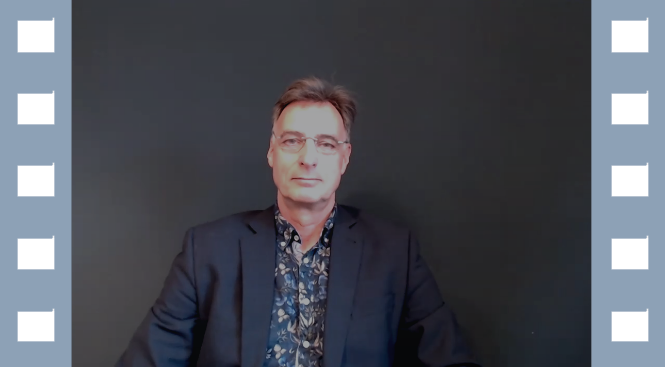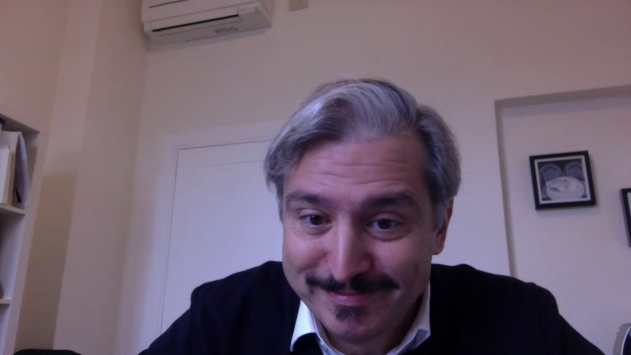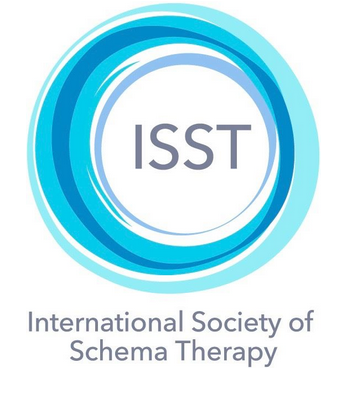On this page you find some instruction stepwise instructions how to apply some of the most important experiential techniques we use in schema therapy. The aim is to connect emotional episodic information processing and cognitive semantic processing systematically to gain maximum effect by changing between the poles of the therapeutic field. We try to activate emotions on the chairs (i.e. with eyes closed)or in imagery alternating with working on the observer level by coming into the image in the adult mode or standing up together and floating above the chairs. The instructions include a suggestion for the therapist´s wording (in Italics). They also show the chair positions in diagrams.
General terms and conditions (GTCs)
Area of application
For legal transactions and legal acts with the Institute for Schema Therapy Frankfurt, Alt-Niederursel 69, 60439 Frankfurt am Main (hereinafter referred to as "IST-F"), the following General Terms and Conditions (GTCs) apply. Terms and conditions of the customer/course participant that deviate from these terms and conditions do not apply. Counter-confirmations of the customer/course participant with reference to his own terms and conditions of business or purchase are expressly rejected. Deviations from this require written confirmation by IST-F.
Conditions of participation
Registration
Conclusion of contract
Registration for any IST-F event or Training is made in writing using a form by letter, e-mail or by registration form via the website. With the registration, the customer submits a binding offer. IST-F will accept or reject the offer by email confirmation. A confirmation of receipt, if sent beforehand, does not constitute a contractual relationship. From the registration on, communication will be conducted exclusively by e-mail to the e-mail address specified in the offer. The customer is therefore obliged to notify a change of e-mail address without delay.
The contract is concluded by the written confirmation of registration and the receipt of the invoice (by email). If a registration cannot be considered, IST-F will inform the registrant* and offer a place on the waiting list or an alternative course. The number of participants* in a course or workshop is limited. Admission to the respective courses is made according to the selection criteria for the respective event or Training. With his/her registration, the participant assures that he/she is able to actively participate in the respective course due to his/her personal prerequisites. With his/her registration, the participant further assures that all his/her details are correct and that he/she will comply with the company and medical confidentiality obligation with regard to information concerning third parties that becomes known to him/her during the seminar.
Charges
The participation fees include the costs for the event(s), the written documentation, the certificate of participation, the recording of the continuing education points for the chamber and the catering (for all-day events: two break caterings and one lunch). The fees are final prices, as the services of IST-F are exempt from VAT according to § 4 No. 21 a) bb) UStG.
Terms of payment
Reservation, invoice, terms of payment
The participation fees are due upon receipt of the invoice at the latest by the stated payment deadline or by the two stated payment deadlines without any deductions. IST-F will keep the requested places free for the customer until the time of the stated payment deadlines. The customer is only entitled to participate in the event if the fees have been paid in full. The invoice sent shall contain the invoice number, the bank details and the date(s) of payment. The payment date is determined as follows: The amount determined as the final sum is due six weeks after having receidved the incoice. For bookings made at shorter notice within one month before the event or Training, the invoice amount is due immediately.
Services of the institute
The IST-F undertakes to fully conduct the courses and seminars in accordance with the contents of the respective invitations to tender in suitable rooms by qualified speakers. Furthermore, the IST-F provides the participants with written seminar materials (in part also in electronic form) and provides suitable beverages during breaks and lunch. In addition, the IST-F undertakes to issue certificates in accordance with the requirements of the granting medical association if continuing education points for these courses are granted by chambers in accordance with § 95 d SGB V (German Social Code, Book V). If qualifications by scientific societies require a separate certification fee, this is included in the participant fee (in case of full participation and qualification service rendered).
Withdrawal / Cancellation / Rebooking
The participant can withdraw from the contract under the following conditions if the IST-F notifies the withdrawal/cancellation in writing by e-mail before the start of the event. The date of receipt of the withdrawal/termination notice by the IST-F is decisive.
- In case of timely cancellation/termination more than one calendar month before the start of the event or Training, no costs will be incurred.
- In the event of written cancellation/termination within 14 days prior to the start of the event or training, a cancellation fee of 50 percent of the participant fee will be charged.
- If a registration is withdrawn on the day the Training begins, the full fee is generally due. If the withdrawal/cancellation is not made in due time or if the participant does not show up or shows up only temporarily, the participant is obligated to pay the full fee.
- The non-attendance of individual teaching units does not entitle the participant to a reduction of the invoice amount.
- The provision of a substitute participant in compliance with the respective selection criteria is possible after examination and confirmation by IST-F. No fee will be charged for this.
- If a participant can move up from the IST-F waiting list, the participation fee will be waived or refunded.
- The position of a substitute participant in compliance with the respective selection criteria is possible after review and confirmation by the IST-F. No fee will be charged for this If a participant from the IST-F waiting list can move up, the participation fee will be waived or refunded.
- Free rebookings are only possible with prior written consent of the IST-F. If the seminar date is changed to a later date, the seminar fee is due on the original seminar date. This also applies analogously to seminar series.
Special right of termination / Termination for cause
The participant may withdraw from/terminate the contract for good cause. In the event of a proper withdrawal/cancellation for good cause, the participant may participate in an equivalent IST-F event for half of the full course fee or, after individual agreement, may make up the participation in a suitable, future IST-F event. An important reason is, for example, an unexpected serious illness, a serious accident of the participant or his/her relatives living in the household, but no operational reasons.
The right to withdraw/terminate for good cause does not apply if the occurrence of the good cause was foreseeable at the time of registration for the seminar event. In the event of withdrawal for good cause, the participant undertakes - as soon as it is possible - to inform IST-F in writing and to provide suitable information and evidence upon request.
Cancellation, suspension and rescheduling of courses
The IST-F is entitled to withdraw from the contract for good cause, regardless of other reasons, in particular if there are not enough registrations for an event or if the event has to be cancelled due to circumstances for which the IST-F is not responsible. In the aforementioned cases, any participation fees already paid for the cancelled event(s) will be refunded in full. Participants are not entitled to any further claims, in particular claims for damages. The events will take place in the rooms specified by IST-F. The respective seminar locations will be communicated in good time before the start of the seminar.
Change of lecturers and seminar rooms
If, in rare exceptional cases, a change of lecturer/lecturer or seminar or course room becomes necessary, the change of lecturer, room and/or a shift in the schedule - provided that the overall quality of the event is not significantly impaired - shall not entitle the participant to withdraw from the contract or to reduce the fee.
Participant's duty to cooperate
The customer is obligated - upon request by the IST-F - to undertake all necessary acts of cooperation so that the IST-F can provide the contractually owed services. If the customer does not fulfill his obligations to cooperate, the IST-F is released from its obligations to the full extent. The obligations of the customer remain unaffected. The IST-F is entitled to exclude participants from further participation in special cases. In these cases, the IST-F is entitled to payment of the full participant fee.
Warranty and guarantees
IST-F does not provide any guarantee. It does not owe success in the provision of the contractual services. It renders the services owed according to the rules of the state recognized at the time of the events and to the best of its knowledge and belief. If, after the event has been held, circumstances change which may have an influence on the success owed under the contract in individual cases, the customer shall have no claims arising from this, unless IST-F is responsible for these circumstances.
Copyright, right of use
All documents and information stored on data carriers, which are made available to the customers within the scope of the events or for the preparation/follow-up of the events, are subject to the applicable copyright and may only be reproduced with the express consent of the lecturer. The customer receives a simple right of use. Image and sound recordings not approved in advance (especially during demonstrations, due to the associated violation of the personal rights of participants) are generally inadmissible and prohibited during the seminars and lead to immediate seminar exclusion with costs.
Liability
IST-F is obliged to work to the best of its knowledge and belief. Liability is limited to intent and gross negligence. It does not have any obligation beyond this. The IST-F is only liable for gross negligence and intent. The liability in case of slight negligence applies exclusively in case of violation of main obligations. In this case, the IST-F's liability for damages is limited to 5,000.00 EUR, unless a higher amount is agreed upon separately and in writing. The aforementioned exclusion of liability also applies to slightly negligent breaches of duty by vicarious agents.
Right of withdrawal
You may revoke your contractual declaration in writing (by letter, fax, e-mail) within two weeks without giving reasons. The period begins at the earliest with receipt of this instruction. The timely dispatch of the revocation is sufficient to comply with the revocation period. The right of revocation expires prematurely if IST-F has begun with the execution of its service before the end of the revocation period.
The revocation is to be addressed to:
Dr. med. Eckhard Roediger
Instiut für Schematherapie Frankfurt
Frauenlobstraße 64
60437 Frankfurt am Main
Data storage
By registering, the participant agrees to the handling and processing of personal data for the purposes of course and examination processing and to the sending of subsequent information in connection with events and publications. Publication for reference purposes requires the written consent of the participant. Your data will never be passed on to third parties by IST-F without your consent.
Jurisdiction and place of performance
Unless otherwise stipulated in the contract, the place of performance and payment is IST-F's place of business. The place of jurisdiction is Frankfurt am Main. The law of the Federal Republic of Germany applies to this contract.
Subsidiary agreements
Ancillary agreements must be made in writing to be effective.
Severability clause
Should individual provisions of this contract be or become invalid, this shall not affect the validity of the remainder of the contract. In such a case, the contracting parties shall replace the invalid provision with a valid provision that comes as close as possible to the objective and economic purpose of the original provision. The same shall apply if a provision should prove to be incomplete.
* For the sake of better readability, only the masculine form of speech is used in these conditions, although all genders are of course meant equally.
ISST-approved ONLINE training for CONTEXTUAL SCHEMA THERAPY
by Eckhard Roediger
Start: 12 October 2021
End: 2 November 2021
On a weekly basis each Tuesday from 1 pm to 3 pm CET (UTC+1)
Location: Online
If you are interested, please use our contact form and register now!
Contextual Schema Therapy– A way to strengthen (functional) Healthy Adult behaviour
Organized by Eckhard Roediger
About this training:
The Healthy Adult mode is the backbone of a successful schema therapy. Despite its pivotal role a detailed description of how to elicit this functional behaviour is lacking in most books on schema therapy. Integrating meta-cognitive techniques (to a large extend taken form Acceptance and Commitment therapy - ACT) substantially add to the table of building Healthy adult skills. The key processes (coined into schema therapy terms) are: Supporting clients to take a mindful observer stance, experience and accept painful child mode emotions in a self-compassionate way, defuse from critic mode voices, distance from dysfunctional coping mode impulses, shift into a balanced Healthy Adult mode, connect with core needs and commit oneself to value-directed functional behaviour. After a brief outline of the model and the principals of the schema therapy relationship small dyadic exercises will bring the theory to live, so the participants will get a vivid experience what the gain of a contextual schema therapy is and how it feels like.
Reading:
Roediger, E., Stevens, B. & Brockman, R. (2018). Contextual Schema Therapy. An Integrative Approach to Personality Disorders, Emotional Dysregulation, and Interpersonal Functioning. Oakland, CA: New Harbinger.
Certification:
This training counts for continuous education credit points according to the ISST-guidelines.
Presenter:
Eckhard Roediger (MD), born 1959, neurologist, psychiatrist and psychotherapist. Trained in psychodynamic and cognitive-behavior therapy. Formerly Director of a Psychosomatic Department of a clinic in Berlin (GER), since 2007 working in Private Practice and Director of the Schema Therapy Training Center in Frankfurt (GER). Member of the ISST Board since 2008, past-President and now honorary member.
Dates and time:
The training takes place on 4 consecutive Tuesdays of 2 hrs each:
October 12, 19, 26
Germany (UTC+1) 01.00 pm - 03.00 pm
New York (UTC-6) 07.00 am - 09.00 am
Moscow (UTC+1) 02.00 pm - 04.00 pm
Sydney (UTC+9) 10.00 pm - 00.00 am
and November 2, 2021
Germany (UTC+1) 01.00 pm - 03.00 pm
New York (UTC-5) 08.00 am - 10.00 am
Moscow (UTC+2) 02.00 pm - 04.00 pm
Sydney (UTC+10) 11.00 pm - 01.00 am
Costs: € 300 (for people from so called “B-countries” € 200; for a B-Country-List* see below). In case a participant is not able to take part at one date we will try to arrange a replacement.
If you are interested, please use our contact form and register now!
*Exclusively for participants who reside in the following countries:
Albania, Argentina, Brazil, Bulgaria, Chile, China, Colombia, Czech Republic, Egypt, Estonia, Greece, Hungary, India, Indonesia, Iran, Jordan, Kosovo, Latvia, Lebanon, Lithuania, Malaysia, Mexico, Morocco, Nigeria, Oman, Pakistan, Peru, Philippines, Poland, Republic of Macedonia, Romania, Russia, Serbia, Slovakia, South Africa, Thailand, Turkey, Ukraine, Venezuela, Vietnam and Yugoslavia.
Coming soon!
Preparing a Separation
ST-C Module 13: The „Highway to Hell“ – preparing a separation (by Eckhard Roediger)
The ST-C Modules 1 to 12 describe the good outcome of a couple’s therapy. You could call this the “Stairway to Heaven”. However, in many cases this is not a reachable goal. Getting to some kind of “living together apart” arrangement where the couples share conjoint fields of interest but live separate lives where they do not match is a reasonable and more frequently realistic result of our work. Nevertheless, more than quite a few couples discover that they actually do not really match with each other and one of the partners decides to quit the relationship. Unfortunately, it takes two partners to start a relationship but only one to end it. This are the steps to take in a separation process:
- Try to collect a feedback from both partners about their summary of your work with them up to this point.
- Use chair dialogues to clarify the pros and cons of separating (or staying together). Offer one chair for each tendency and ask the clients to sit on both chairs with eyes close. Let them picture their life on both chairs half a year after a separation and ask how they feel. Therapist: “Now you are sitting on the pro-chair. How do you feel half a year after you separated? What’s been working better? How is your life easier or more pleasant?” Then let the client move to the contra-chair. “How do you feel now on the “contra chair” half a year later? What do you miss about your partner and your relationship? What is more difficult now?” At the end ask the client: “How many percent are on the separation side of the balance and how many percent on the continuing side?” Do this exercise with both partners.
- If there is still enough “good-will” on both sides to give it another try make an agreement on what exactly the couple wants to work on for a defined period of time (e.g. one, two or maximum three months). Define the exact behaviour they need to show. After this time re-evaluate the process.
- If the result is not satisfying propose an experimental separation for a defined time (e.g. one, two or maximum three months). This works best if the couple can live in different places. Decide how you want to continue to work together during this time.
- Re-evaluate the process. If one of the partners wants to quit, state the mismatch of interests and make clear, that it is probably better to separate than to continue fighting.
- Try to find fair solutions for the remaining issues. Refer the couple to a mediator to fix legal issues. Clarify if one partner wants to continue individual sessions and the other partner accepts that.
- If possible, end the couple’s meetings with a positive feedback on what both partners are thankful for after all the years together despite the differences and conflicts they have now.
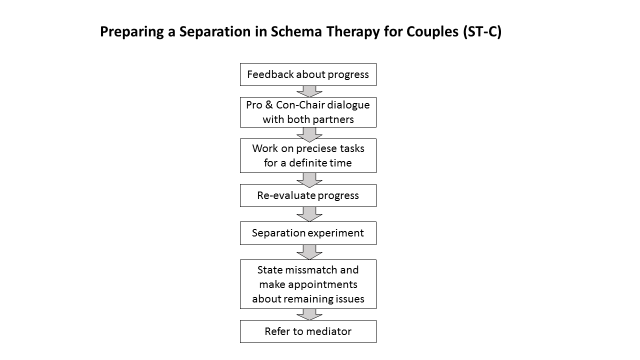
The modules
SCT-Module 1 - explaining the model
STC module 2 - Introducing the Mode Cycle Clashcard
STC module 3 - stopping mode clashes
STC module 4 - Rebalancing after separationSTC
STC module 5 - accessing the VC
STC Module 6 - Honeymoon imagery
STC module 7 - accessing the assertive side_new
STC Module 8 - Empowerment imagery exercise_new
STC Module 9 - Reconnecting through conjoint imagery
STC Module 10 - training the healthy adult mode
STC Module 11 - Connection dialog
STC module 12 - homework assignments
Couples ST- modules overview
The Schema Therapy for couples (ST-C) Module System (by Eckhard Roediger)
The modules described below are meant to guide you step by step through a strategically focused therapy process with a couple. They are based on the idea starting with the mode cycle presented in the first session without a prior diagnostic phase. The full model is outlined in the book “Schema Therapy with couples” published by Wiley*. Together with the content of the book and our ST-C training workshops the modules will enable you to “start working under fire” in a surprisingly effective way.
The underlying assumptions (in a nutshell):
- The main interactional problem of the couple is getting stuck in their default mode cycle.
- This mode cycle represents a rigid and persisting dysfunctional interactional pattern.
- The pattern remains the same while the content changes. Thus we ignore all kind of content but solely focus on the presented cycle as the “common enemy” both partners contribute to.
- In the sessions the couple plays out their default mode cycles too.
- We work most effectively if we focus on the dysfunctional mode cycle presented in-session, because it is present in the here and now of the therapy room visible for everybody.
- We try to work with the interaction in the present moment. We only ask for the most important social data, introduce the model and avoid going to past problems.
- Once the couple learned to identify and stop the cycle, re-balance themselves and shift to a problem-solving oriented interaction pattern they are able to deal with any critical content.
- We access the most relevant schemas fueling the presented mode cycle by conjoint imagery exercises. To some extend this replaces an intital diagnostic phase. The rescripting part includes a reparenting by the observing partner This strenghtens the emotional bond (see Roediger et al., 2018)
- If we get stuck with the couple because one (or both) partner(s) is not able to leave their role in the cycle we can offer individual sessions to work with the individual under safer conditions. Then we might go deeper into the biographical background (e.g. underlying schemas).
- We try to share content from individual sessions as much as possible in the following conjoint session to strengthen the bond of understanding within the couple.
- The goal of therapy is accomplished once the couple learend to solve their problems in the best possible way by using the connection dialogue skills.
Overview about the modules:
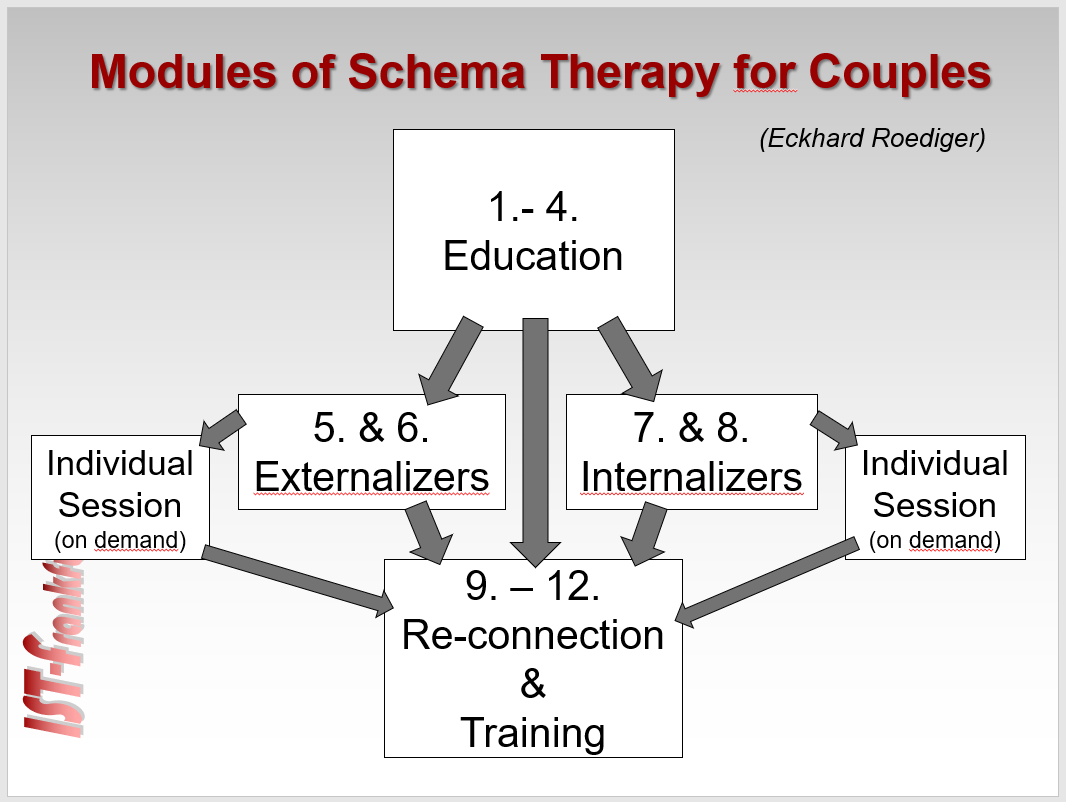

The course of therapy:
- The introductory part are the modules 1 to 4. With a functional couple they can be covered in the first two or three sessions.
- If both partners are able to re-balance themselves in a functional way you can go directly to modules 9 to 12. Then the therapy might not take longer than 8 to 12 sessions.
- If one partner fails to re-balance go to modules 5 and 6 (externalizers) to get access to the vulnerable side or to modules 7 and 8 (internalizers) to strengthen the assertive side.
- If the client cannot access the blocked side in the presence of their partner offer individual sessions in the required amount, if necessary for both partners on parallel tracks. Once they are able to get into a balanced state continue with module 9 to 12.
- If a separation becomes more likely go to module 13
The ST-C-Modules are:
- SCT-Module 1 - Explaining the simplified "two leg" model
- STC Module 2 - Introducing the Mode Cycle Clashcard
- STC Module 3 - Stopping mode clashes
- STC Module 4 - Re-balancing after „time-out“
- STC Module 5 - Accessing the vulnerable side
- STC Module 6 - Honeymoon imagery
- STC module 7 - Accessing the assertive side
- STC Module 8 - Empowerment imagery exercise
- STC Module 9 - Reconnecting through conjoint imagery
- STC Module 10 - Training the healthy adult mode
- STC Module 11 - Connection dialogue
- STC Module 12 - Homework assignments
- STC Module 13 - Preparing a separation
Optional modules
Module - Dealing with intruding critic voices or beliefs
Module - Dealing with strong emotions or hurting
Video tutorial how to explain the Still face-Video to the couples
*Simeone-DiFrancesco, C., Roediger, E., & Stevens, B. (2015). Schema Therapy with Couples.
A Practitioner’s Guide to Healing Relationships. Oxford-New York: Wiley.
Publications by Eckhard Roediger
- Breaking Negative Relationship Patterns
A Schema Therapy Self-help and Support Book. Oxford-New York: Wileytevens, B., & Roediger, E. (2016).
-
Schema Therapy with Couples
A Practitioner’s Guide to Healing Relationships. Oxford-New York: Wiley. Simeone-DiFrancesco, C., Roediger, E., & Stevens, B. (2015). „The latter book introduces into the principles of Schema therapy with couples. -
Couples Therapy Module System
For those, who want to get practical, we presented our “Module System” with detailed instructions on this website. Please take a look and give it a try. You will be surprised, how well it works! This Video presented on the ISST Virtual Summit 2020 gives you an introduction.
Impressum
Verantwortlich im Sinne des Presserechts sowie des Teledienstegesetzes:
Dr. med. Eckhard Roediger
Frauenlobstraße 64
60487 Frankfurt/Main
Telefon. : +49 (0)69 / 43008647
Fax: +49 (0)69 / 43008649
E-Mail: Dr. Eckhard Roediger
Haftungshinweis: Trotz sorgfältiger inhaltlicher Kontrolle übernehmen wir keine Haftung für die Inhalte externer Links. Für den Inhalt der verlinkten Seiten sind ausschließlich deren Betreiber verantwortlich.


